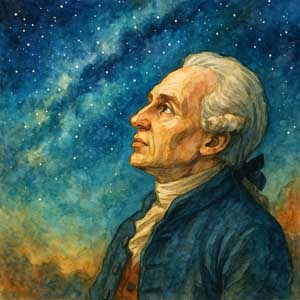— Immanuel Kant
 Born in Königsberg (now part of Russia), philosopher Immanuel Kant (1724–1804) shaped modern Western thought with questions that stirred both reason and faith. What can I know? What should I do? For what may I hope?
Born in Königsberg (now part of Russia), philosopher Immanuel Kant (1724–1804) shaped modern Western thought with questions that stirred both reason and faith. What can I know? What should I do? For what may I hope?
Small, frail, and deeply disciplined, Kant believed the only world we truly know is the one we perceive—filtered through our senses, shaped by judgment and experience. He saw philosophy as a way to organize life, to explore the outer reaches of imagination and the grounding forces of moral character.
He once wrote, “We are not rich by what we possess but rather by what we can do without.” Though he never traveled far from home, his mind soared across the stars, grappling with freedom, duty, and the unseen truths of existence. His groundbreaking Critique of Pure Reason (1781) remains a fearless dive into the unknown.
“Two things fill the mind with ever new and increasing admiration and awe,” he said, “the more often and steadily we reflect upon them: the starry heavens above me and the moral law within me.”
Kant didn’t chase fame or fortune—he pursued truth. With humility and discipline, he shaped a quiet revolution. The universe within us, he taught, is as wondrous as the cosmos above.
 Let your character shine like the stars. ✨
Let your character shine like the stars. ✨
